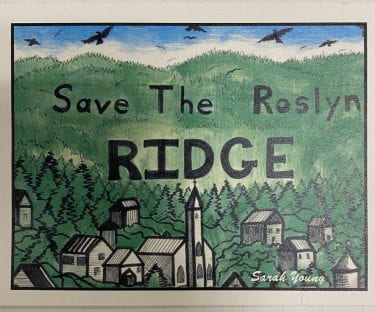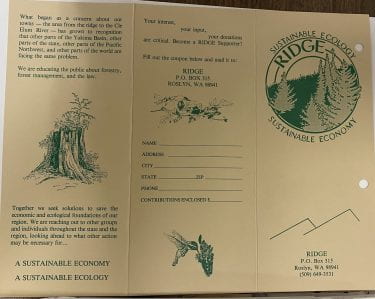November 5, 2020
Labor Archives of Washington Spotlight: RIDGE Records Showcase Coalition-Building among Labor and Environmental Activists

“Save Roslyn RIDGE” postcard, RIDGE records, Accession No. 6295-001): A postcard from the RIDGE records Crystal Rodgers photographed during a visit to the archives.
This fall, I am working at the Labor Archives of Washington (LAW) in Special Collections at the University of Washington Libraries as their archivist-in-residence. Through a paid internship with Northwest Archivists, I have been processing the RIDGE records remotely from my home in Iowa. The newly-acquired collection documents land use activism in Kittitas County, WA. We selected this collection for processing because of its unique relationship to Washington State’s labor history. I was really drawn to working on this collection because of RIDGE’s model of coalition activism that united many different groups under the same banner: protecting land from development and over-extraction. We are excited to launch the updated collection here, in the RIDGE Records finding aid (Finding aids are research guides to archival collections).
About RIDGE and the RIDGE Records
RIDGE was a community organization formed in Roslyn, Washington in 1988 that engaged in activism centered on forestry and land use issues in Upper Kittitas County, Washington. Community members were concerned about the negative effects development and logging in the area would have on both the environment and economy. The group formally organized shortly before Plum Creek Timber Company (now Weyerhaeuser) announced plans to log approximately 15,000 acres of timber near Roslyn. Many residents in Roslyn were already familiar with the boom and bust cycle of extractive industries in small towns– Roslyn was a mining town that was hit hard when their last mine closed in 1963.
RIDGE’s efforts to support a sustainable economy and ecology in Upper Kittitas County took many forms. They participated in sustainable forestry groups and coalitions in Washington State, advocated for more protective zoning for forest lands, and fought to block the development of what is now the Suncadia Resort. RIDGE used strategies such as land use mapping, litigation, working with local and state government, and community meetings to fortify support and build their coalition. Once it was evident Suncadia was going to be built despite efforts to block the development, the coalition fought for and obtained a pledge for employing union workers in its construction– an important aspect of how the building trades were involved in RIDGE.
RIDGE’s most well-known project is perhaps their long legal battle with Suncadia Resort. RIDGE and the resort owners signed a Settlement Agreement in 2001 to mitigate the impact of the resort on the town of Roslyn and the surrounding environment– with several amendments added throughout the years for additional protections. However, the resort owners (which changed hands several times during the building of Suncadia) sought to dissolve the resolution in the courts and eventually succeeded. RIDGE dissolved in 2014 following the termination of the Settlement Agreement in 2013.
Records in the collection include litigation material related to the development of the Suncadia Resort, RIDGE office files, newspaper clippings documenting RIDGE’s projects and activism, land use maps, and RIDGE promotional material, such as pamphlets and newsletters. This collection is of high anticipated research value because of RIDGE’s coalition model of activism and the relative modernity of the collection– they were active into the 2010s! Students, faculty, researchers and organizers can use the primary sources in the collection to learn about topics related to land use, sustainable forestry, environmentalism, and labor union coalition-building.
RIDGE’s Connection to Labor

RIDGE brochure, RIDGE records, Accession No. 6295-001): A brochure from the RIDGE records Crystal Rodgers photographed during a visit to the archives. The image features RIDGE’s “sustainable ecology, sustainable economy” logo.
RIDGE’s connection to labor organizing is unique among other environmental groups of the time. Their alignment with the labor movement not only happened in practice through negotiating for union contracts, but through their philosophical positions. RIDGE challenged the notion that extractive economy workers and environmentalists have competing interests, and instead sought to harmonize the need for a sustainable forest economy among workers and those concerned with the environment. RIDGE’s motto, “Sustainable Ecology, Sustainable Economy”, is featured on material throughout the collection, including this pamphlet from RIDGE’s early years.
RIDGE challenged the notion that extractive economy workers and environmentalists have competing interests, and instead sought to harmonize the need for a sustainable forest economy among workers and those concerned with the environment.
The organization’s leaders also had strong ties with the labor movement. Doug Kilgore is connected to the labor movement in Washington State (he played a large role in brokering the involvement of labor groups), and Ellie Belew researched and authored several books in collaboration with labor unions and labor activists. We were fortunate enough to work with both Doug and Ellie during processing of the RIDGE collection! This was especially helpful because most of this work was done remotely, and access to the physical material was very limited due to COVID-19 restrictions.
Next Steps for the Collection
When staff members are able to safely return to work in the archives, the RIDGE records will receive more attention. They will be physically arranged to reflect the new series and subseries arrangement in the updated collection inventory of the finding aid, and some additional preservation concerns will be addressed, including better storage for the oversized maps and migrating and describing digital files stored on cd-roms that remain unprocessed. All of this work means increased access and longevity of these materials for use by future generations!
Once public operations resume, researchers can access these materials in the Special Collections Research Room located in the Allen Library South Basement. You can learn more about using the collections, including how to prepare for your research visit, on the Special Collections webpage.
About the Partnership
My position is funded as an “archivist in residence”, sponsored by the Northwest Archivists, a professional organization for archival workers in the Pacific Northwest that offers a paid internship for the applicant who jointly proposes a project with a sponsoring organization. The program is designed to offer early-career professionals a paid opportunity, tailored to their interests, while also working towards the long-term goal of eliminating unpaid work within the archival profession.
Given LAW’s strong commitment to ethical labor practices, we decided to collaborate on a project proposal for the pilot program, and we were very fortunate to have our proposal selected! In short, archival processing consists of tasks that help prepare the material in the collection for use by the public– including organizing the collection and creating descriptions. Though the collection was re-housed for long-term preservation in acid free folders and boxes and briefly described after donation to the Labor Archives in 2019, more processing was needed to make the collection more accessible to researchers. We selected RIDGE because of the size and scale of the project, but also because of the collections contents, and its relevance to current events and impact in the Pacific Northwest.
About the Author:
Abbey Maynard (she/her) is a 2020 graduate from the University of Washington’s Masters of Library and Information Science program. She is Northwest Archivist’s 2020 Archivist-in-Residence at the Labor Archives of Washington. Abbey lives in Des Moines, Iowa.
###

